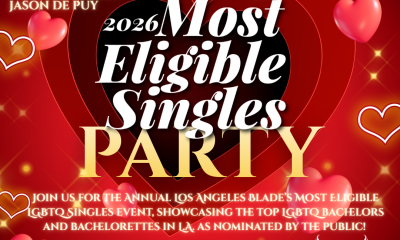West Hollywood
West Hollywood in brief- City government in action this week
Celebrate Russian-Speaking Community, Free Screening ‘AIDS Diva: The Legend of Connie Norman,’ Open Call for Arts Grant Applications plus more
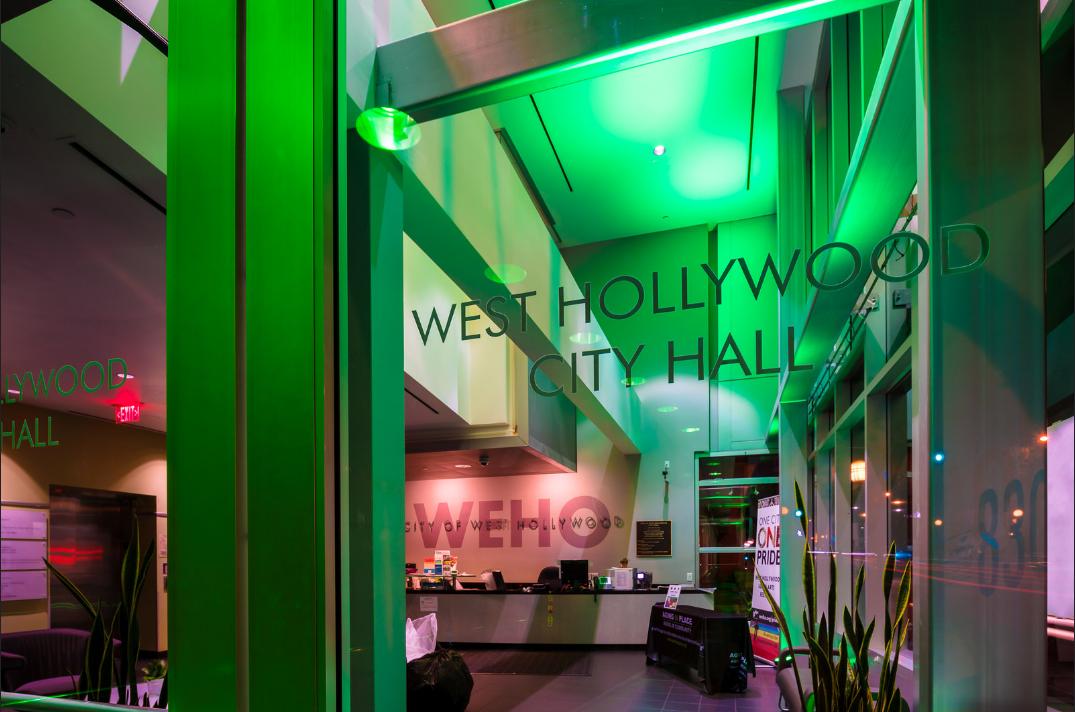
West Hollywood to Celebrate Russian-Speaking Community Cultural Heritage Month with Multiple Events
The City of West Hollywood annually celebrates the rich traditions brought to the United States by Russian-speaking immigrants from the former Soviet Union. Each year, the City recognizes Russian-speaking Community Cultural Heritage Month to embrace the diverse identities and cultural history of Russian-speaking community members whose origins span wide-ranging territories with varied religious and social traditions.
The former Soviet Union encompassed 15 republics — Russia, Ukraine, Georgia, Belorussia, Uzbekistan, Armenia, Azerbaijan, Kazakhstan, Kyrgyzstan, Moldova, Turkmenistan, Tajikistan, Latvia, Lithuania, and Estonia — and Russian culture, itself, has withstood centuries. With more than 100 distinct ethnic groups within the former USSR, Russian culture does not represent any one group. For Russian-speaking people, Russian language unites people and serves to connect and deepen a common culture across regions.
This year, as the devastation of war continues to grip Ukraine, Russian-speaking Community Cultural Heritage Month programming will continue to focus on standing for peace in Ukraine and bringing the diverse Russian-speaking community together to share the cultural heritage and welcome new members of the community.
The following events are Russian-speaking Community Cultural Heritage Month events presented by the City of West Hollywood and its Russian-speaking Advisory Board during May:
On Sunday, May 7, 2023 at 12 p.m., the City of West Hollywood presents Victory in Europe Day, which marks the end of the Nazi regime in Germany and the defeat of the German army in Europe. The event will take place at Plummer Park’s Fiesta Hall, located at 7377 Santa Monica Boulevard, and will serve as a remembrance of the estimated 50 million people who lost their lives during World War II. The event will be followed by MUSIC WITH A MOVIE CAMERA, dedicated to the Victory in Europe Day, presented by Helix Collective. The ensemble performs music from the innovative films of the 1920-80s by composers from the former Soviet Union such as including It’s a Wonderful Life with a score by Dimitri Tiomkin, Man with a Movie Camera, one of the earliest depictions of the cities of Ukraine on film, The Gadfly, with music by Dimitri Shostakovich, and more. This is a free event and no RSVP is required. For more information, please call (323) 848-6501 or email [email protected].
On Saturday, May 13, 2023, at 4 p.m., the City’s Russian-speaking Advisory Board presents MaySky Classical Night 2023, an evening filled with beautiful classical music performed by world-renowned stars. This year’s event will be held at the City’s Council Chambers/Public Meeting Room, located at 625 N. San Vicente Boulevard, and will benefit Casa De Luz via the Imperial Court to Los Angeles and Hollywood. Casa De Luz is a refugee house on the border of Mexico and the United States that provides shelter to people who otherwise would be prosecuted or executed in their own countries.
On Sunday, May 21, 2023, from 11 a.m. to 7 p.m., the City and its Russian-speaking Advisory Board will host the 22nd Annual WeHo Mishka Festival at Plummer Park, located at 7377 Santa Monica Boulevard. The event will embrace the opportunity to explore and share the deep historical elements of Russian culture. It will also feature the 17th Annual Russian-speaking Community Awards presentation. The day will also feature a reception for the Art of Wellness exhibition currently showing in Long Hall. For more information, call (323) 848-6501.
On Sunday, May 28, 2023 at 11:30 a.m., 11 of the best animators in the region will gather on the same stage in the extraordinarily bright Candy Land children’s show where exciting adventures await in the sweet land ruled by the Candy Queen and the Candy King. This free show will take place in Plummer Park’s Fiesta Hall, located at 7377 Santa Monica Boulevard.
About the Russian-Speaking Community in West Hollywood — The City of West Hollywood is home to a large community of people from regions of the former Soviet Union. According to a 2013 survey of the community in West Hollywood, there are 3,872 people who live in the City who identify a former region of the Soviet Union as their primary ancestry. This represents approximately 11 percent of the City’s total population of 34,399 people.
Many Russian-speaking community members established roots in West Hollywood after fleeing from discrimination and antisemitism. In the early 1970s, the then-USSR experienced a wave of emigration due to the politics of the government. Many people chose to come to Los Angeles to embrace the future opportunities of a free world for themselves and their children. They came here by way of support provided by local programs and nonprofits to assist Jewish immigrants in what would become incorporated as the City of West Hollywood. The City remains a thriving hub for the Russian-speaking community in the region.
Since 2001, the City has recognized the Russian-speaking Community Cultural Heritage Month to bring to life the cultural and creative traditions of Russian-speaking community members with programming highlighting rich visual arts, performing arts, language, and history.
Details about additional Russian-Speaking Community Cultural Heritage Month programs are available by visiting www.weho.org/RSCweho.
For more information, please contact Tatyana Rodzinek, City of West Hollywood Russian-speaking Community Programs Coordinator, at (323) 848-6826 or at [email protected].
City of West Hollywood Announces Open Call for Arts Grant Applications
The City has opened applications for its 2024 Arts Grant program. For those who are interested in applying, the City will host a virtual Arts Grant Program workshop via the Zoom platform on Wednesday, May 24, 2023 at 12 p.m. Participants will learn about grant eligibility requirements and the application process, as well as have the opportunity to ask questions. First-time grant applicants and returning organizations with new development personnel are strongly encouraged to attend the Arts Grant Program information workshop to become familiar with the application process.
Grant opportunities are available to individuals and nonprofit arts organizations. Arts grants will be awarded in varying amounts and include funding for performing arts projects, individual artists, and organizational development.
The City of West Hollywood invites and encourages artists and organizations representing diverse populations and diverse artistic disciplines to apply for these grants. As defined in the City’s Cultural Equity Statement, diversity includes all ways in which people differ, including but not limited to, race, ethnicity, gender, socioeconomic status, education, age, gender identity, gender expression, sexual orientation, ability, geography, citizenship status, religion, language, physical appearance, and the intersection of these various identities. The City commits to ensuring cultural equity in all arts policies and practices.
The arts grants categories with open application processes for 2024 are as follows:
Arts Project Grant — Supports the production, performance, or presentation of art projects that take place in the City of West Hollywood and that serve the West Hollywood community. The proposed projects should take place in the City of West Hollywood in 2024 and 2025. Proposed presentations may include, but are not limited to: comedy show, dance performance, drag performance, film screening, fine art exhibit, music presentation, poetry reading, and theatre presentation. The Arts Project Grant category is a match grant (a match grant requires that for every dollar requested from the funding source, the equal amount is matched – through in-kind donations, private donations, and/or other grants) and is awarded in a two-year cycle (with one application, grantee can be awarded for 2 years). The maximum grant award is $20,000 per grantee ($10,000 per year). The deadline for this category is Saturday, July 1, 2023.
Community Arts Grant — Supports non-profit arts organizations with a history of supporting BIPOC and/or female artists and audiences. Proposed projects should take place in West Hollywood in 2024. Proposed presentations can include celebrating heritage months, presenting social justice centered art, and/or an educational and participatory program (workshop) which engages BIPOC and/or female artists and audiences. The maximum grant award for this category is $6,000. The deadline for this category is Saturday, July 1, 2023.
Organizational Development Grant — Supports both the organization’s mission to provide arts programming and the organization’s capacity by directly supporting technical assistance to improve its ability to fundraise, develop audiences, and build its administrative infrastructure. This grant category is not a match grant and, with one application, an organization can be funded for three years. Applicant organizations should be prepared to utilize a Technical Assistant (or arts consultant) to provide sustainable resources to the organization. The maximum grant is $5,000 per grantee per year ($5,000 for each of the first two years dedicated to technical assistance; the final year for the grantee presentation). This award includes enrollment in the West Hollywood Artists Bootcamp, a highly sought after professional development series about the business of art. The deadline for this category is Saturday, July 1, 2023.
Transgender Arts Initiative Grant — Supports and enhances the presentation of artworks in West Hollywood by transgender artists and non-profit organizations with a history of supporting transgender artists. Proposed projects should take place in West Hollywood in 2024. Proposed presentations should include art presentations which engage trans artists and audiences. The maximum grant award is $6,500 for both artists and non-profit arts organizations. The deadline for this category is Saturday, July 1, 2023.
WeHo Artist Grant — Supports the long-term development of an artist’s ideas by providing funds that increase the capacity for artists to realize work, advance the conditions of creation, and navigate the complexities of both making art and making a career. Eligible artists must reside in the City of West Hollywood. The grant award is $6,000 per year for three artists. This category will open on July 1, 2023 and the deadline for applications will be Friday, September 1, 2023. WeHo Artist applications are reviewed by the Performing Arts and Cultural Affairs Subcommittee.
Artists and organizations interested in applying may visit www.weho.org/arts for more information.
For more information about the City of West Hollywood’s Arts Grant Program, please visit www.weho.org/arts or contact Eva Angeloff, City of West Hollywood Grants Coordinator, at (323) 848-6354 or at [email protected].
‘Senior Month’ with Activities throughout the Month of May
For more than two decades, the City of West Hollywood has organized an annual series of activities to engage its thriving population of older community members during Senior Month, celebrated each May. West Hollywood’s ongoing efforts to support, celebrate, and value older adults is part of the commitment to being an age-friendly city.
The City of West Hollywood’s Senior Advisory Board meeting will take place on Wednesday, May 24, 2023 at 2 p.m. at the City’s Council Chambers/Public Meeting Room, located at 625 N. San Vicente Boulevard. This meeting will include a discussion of issues of importance to the older adult community. The meeting will also be livestreamed and available for replay on the City’s WeHoTV YouTube channel at www.youtube.com/wehotv.
Additional programing in May includes:
- Honeycomb Harmonies by Keenan Hartsen – Saturday, May 6, 2023 at 10 a.m. at Plummer Park’s Vista Lawn, located at 7377 Santa Monica Boulevard – Hosted by the City of West Hollywood’s Arts Division, paint tires and play recycled musical instruments with artist Keenan Hartsen at this interactive art installation in the park.
- 78th Anniversary of Victory in Europe Day – Sunday, May 7, 2023 at 12 p.m. at Plummer Park Fiesta Hall, located at 7377 Santa Monica Boulevard – Co-hosted by the City of West Hollywood’s Russian-Speaking Advisory Board and the West Hollywood Comprehensive Services Center, Helix Collective’s 10-piece film-music ensemble will perform music from the innovative films of the 1920s to 1980s by composers from the former Soviet Union.
- Maysky Classical Night – Saturday, May 13, 2023 at 5 p.m. at the West Hollywood City Council Chambers/Public Meeting Room, located at 625 N. San Vicente Boulevard – Join the City of West Hollywood’s Russian-Speaking Advisory Board for an evening filled with beautiful classical music. RSVP is requested at https://givebutter.com/2023Maysky
- Walt Disney Family (virtual) Museum Tour – Tuesday, May 16, 2023 at 12 p.m. – Join the museum’s certified Storyteller Guide for a virtual journey through the Walt Disney Family Museum. Contact (323) 876-1717 for more information and to register for this virtual tour.
- Human Rights Speakers Series: AIDS Diva: The Legend of Connie Norman – Saturday, May 20, 2023 at 2 p.m. at the West Hollywood City Council Chambers/Public Meeting Room, located at 625 N. San Vicente Boulevard – Connie Norman was a fierce, witty, and compassionate AIDS/Trans activist in ’80s and ’90s Los Angeles. The film uniquely and intimately explores the overall story of AIDS activism through the life of Connie Norman, and “ordinary kids achieving the extraordinary” by confronting a plague when others wouldn’t, and essentially defending their right to exist. The event will also include an interactive intergenerational discussion exploring youth-led human rights activism in the past and today. Come learn about the activism of the past to help inform the activism of the future! Free Admission. RSVP Required: https://HRSS-2023May20.eventbrite.com
- Seniors In Action (SIA): Community + Connection + Conversation – Tuesday, May 23, 2023 at 2 p.m. at the West Hollywood Library Community Meeting Room, located at 625 N. San Vicente Boulevard – Activities that provide engaging opportunities for participants to learn something new, contribute their talents and experience, and deepen their connection to the West Hollywood Community. This is an interactive experience, so be prepared to participate! Seniors In Action is presented by the West Hollywood Comprehensive Services Center in collaboration with the City of West Hollywood’s Senior Advisory Board. Please contact Marina Goldshteyn at [email protected] to sign up and receive more information. SIA events are held monthly on every fourth Tuesday of the month at 2 p.m.
- “Eddy’s World” – Wednesday, May 31, 2023 at 12:30 p.m. at the West Hollywood Community Center at Plummer Park, Rooms 5 and 6, located at 7377 Santa Monica Boulevard – Film screening, followed by Q&A with director Lyn Goldfarb, Eddy’s daughter. Eddy’s World is an engaging portrait of a 101-year-old toy inventor. Optimistic, creative, and curious, Eddy is an endearing storyteller who shares his philosophies of life and his wisdom on aging. No RSVP required.
Community members ages 50+ are also encouraged to enjoy the many virtual and in-person programs and services offered by Los Angeles LGBT Center Senior Services Department. The Senior Services May newsletter, including the calendar of events and information about how to RSVP is available on the Los Angeles LGBT Center’s website. This month’s highlighted activities are:
- Senior Art Exhibition Opening – Thursday, May 4, 2023 at 5 p.m. in the Gallery at The Village at Ed Gould Plaza, located at 1125 N. McCadden Place in Hollywood – Opening reception for the exhibition featuring art created during the Senior Arts Program. The show will run through the month of May.
- National LGBTQ Elders Day – Tuesday, May 16, 2023 at 12:30 p.m. at the Los Angeles LGBT Center’s Senior Center, located at 1118 N. McCadden Place in Hollywood – Join the Los Angeles LGBT Center for a lunch and service to pay tribute to earlier generations whose activism and bravery have created a path for younger community members to envision a future free from discrimination and stigmatization.
- Art Lecture: Breaking the Gay Code – Wednesday, May 17 at 3 p.m. at the Senior Center, located at 1118 N. McCadden Place in Hollywood – Learn about the double lives of iconic queer artists. Discover Caravaggio’s audacious life, John Singer Sargent’s secret muses, the extraordinary female artists living in Boston marriages, and Frida Kahlo’s intimate relationship with Georgia O’Keeffe.
- Senior Showcase – Wednesday, May 24, 2023 at 2 p.m. at the Village at Ed Gould Plaza, located at 1125 N. McCadden Place in Hollywood – Senior Center groups will come together to showcase their talents including writing, dancing, exercises, and much more!
Senior Month programming is presented by the City of West Hollywood and its Senior Advisory Board, the Activities Program of West Hollywood Comprehensive Services Center of Jewish Family Service LA, and the Los Angeles LGBT Center.For more information about additional related programming in the month of May and about senior services in the City of West Hollywood, please visit www.weho.org/services/social-services/senior-services. For additional information about City of West Hollywood’s Aging in Place/Aging in Community Strategic Plan, please visit www.weho.org/aging.
City of West Hollywood and Congregation Kol Ami will ‘Shalom Peace Square’ at Event on Sunday, May 7 at 4 p.m.
The City of West Hollywood and Congregation Kol Ami will dedicate the intersection of N. La Brea Avenue and Lexington Avenue as Shalom Peace Square. There will be an official Shalom Peace Square sign unveiling ceremony on Sunday, May 7, 2023 at 4 p.m. at the corner of N. La Brea Avenue and Lexington Avenue, adjacent to Congregation Kol Ami, located at 1200 N. La Brea Avenue. A reception will follow in the temple courtyard following the dedication.
Since its founding in 1992, Congregation Kol Ami has become an important leader in the Jewish, LGBTQ+, and West Hollywood communities and its commitment to progressive spirituality, diversity, inclusion, and social justice has been celebrated nationwide. For more information and to register in advance to attend the Shalom Peace Square sign unveiling ceremony, please visit the Congregation Kol Ami website at www.kol-ami.org/event/shalompeace.
For additional information, please contact Jennifer Del Toro, the City of West Hollywood’s Community and Legislative Affairs Supervisor, at (323) 848-6549 or at [email protected].
Human Rights Speakers Series Presents an Interactive Discussion and Free Screening of ‘AIDS Diva: The Legend of Connie Norman’
West Hollywood’s Human Rights Speakers Series, in conjunction with ONE Archives Foundation, will host a screening of the film AIDS Diva: The Legend of Connie Norman followed by an interactive discussion exploring youth-led human rights activism.
The event will take place on Saturday, May 20, 2022, at the City of West Hollywood’s Council Chambers/Public Meeting Room, located at 625 N. San Vicente Boulevard. Doors will open at 1:30 p.m. and opening remarks will take place at 2 p.m., the film screening will begin at 2:15 p.m., followed by an interactive discussion on youth-led activism. The event is free, but seating is limited. RSVP is requested at https://HRSS-2023May20.eventbrite.com
The award-winning documentary film AIDS DIVA: The Legend of Connie Norman, features the fierce, witty, and compassionate AIDS/Trans activist in ’80s and ’90s Los Angeles. The film uniquely and intimately explores the overall story of AIDS activism through the life of Connie Norman and “ordinary kids achieving the extraordinary” by confronting a plague when others wouldn’t, essentially defending their right to exist.
The event will also include an interactive intergenerational discussion exploring youth-led human rights activism in the past and today. Come learn about the activism of the past to help inform the activism of the future!
The City of West Hollywood’s Human Rights Speakers Series brings together diverse communities to learn about and discuss global, national, and local human rights issues in a supportive environment. The series reflects the City’s commitment to human rights and core value of Respect and Support for People.
For additional information about the Human Rights Speakers Series, please visit www.weho.org/hrss.For more information, please contact Joy Tribble, the City of West Hollywood’s Arts Specialist, at (323) 848-6360 or at [email protected].
West Hollywood City Council Adopts First-in-the-Nation Glue Trap Ban
The West Hollywood City Council unanimously adopted an ordinance banning the sale and use of glue traps in the City of West Hollywood. This anticruelty measure is the first in the United States to ban the sale and use of glue traps and is consistent with the City’s progressive animal welfare policies. The Ordinance will go into effect next year.
Glue traps have long been recognized worldwide to be cruel and indiscriminate. They are intended to attract rodents, insects, and vermin; however, they frequently trap other animals, including rabbits, opossums, and even companion animals such as dogs and cats. It is not uncommon for birds, attracted by insects caught in devices, to also become unintended victims of the traps.
“The City of West Hollywood has always been a leader on issues related to animal welfare,” said City of West Hollywood Councilmember Lauren Meister. “My council colleagues and I enthusiastically adopted this ordinance to prohibit the use and sale of glue traps within the City because these devices are sadistic and cruel. As a compassionate and progressive city, it is incumbent on us to find more humane alternatives to rodent and pest control.”
The primary goal of a glue trap is to entrap rodents or other pests when they cross the board since their feet and bodies stick to the adhesive. The animals are then incapable of freeing themselves and slowly other parts of their bodies get stuck to the trap, or they suffer from starvation, dehydration, or suffocation. After several days or weeks, the animal dies, but the process is extremely cruel, painful and subjects the animal to a slow and inhumane death.
According to the People for the Ethical Treatment of Animals (PETA), these traps have been used to capture other wildlife including birds, snakes, and squirrels. PETA reports there are numerous reports of cats becoming stuck in glue traps and requiring veterinary assistance. Additionally, the U.S. Centers for Disease Control and Prevention warns against using glue traps as trapped animals produce urine and feces, which may have harmful human health impacts.
The City of West Hollywood has been on the forefront of animal rights and protections for decades and the City’s commitment to animal rights is one of its legacies. The City has consistently worked to enact leading-edge animal welfare legislation:
- in 1989, the West Hollywood City Council passed a Resolution 558 making West Hollywood a “Cruelty Free Zone” for animals. This action was then followed by West Hollywood’s move to secure animal care service policies that included a no-kill policy for stray and abandoned animals. The City also focused its efforts on raising awareness about the availability of thousands of abandoned animals at shelters waiting to be adopted, even sponsoring local adoption fairs at our City parks—a tradition that continues to this day,
- in 2004, the West Hollywood City Council passed an Ordinance to ban the practice of declawing cats, thereby making West Hollywood the first City in North America to ban this procedure,
- in 2008, the City of West Hollywood adopted a Resolution supporting Proposition 2, which led to a statewide standard in the caging of chickens,
- in 2009, the West Hollywood City Council took a stand against puppy-mills and the sale of dogs in local stores that came from such mills, and
- in 2011, the West Hollywood City Council passed an Ordinance prohibiting the sale of fur established that it is “unlawful to sell, offer for sale, display for sale, import, export, trade, or distribute any fur product by any means anywhere within the City of West Hollywood on or after September 21, 2013.”
For more information on the scope of the ordinance and the implementation timeline, please contact City of West Hollywood Governmental Affairs Liaison Hernan Molina, at [email protected] or at (323) 848-6364.
Resolution Declaring the City of West Hollywood a Sanctuary City for Transgender People
The City Council of the City of West Hollywood has adopted a resolution declaring the City of West Hollywood a Sanctuary City for Transgender People.
Across the nation, there is an unprecedented wave of legislation targeting the transgender and LGBTQ+ communities. 2023 marks the fourth consecutive record-breaking year for anti-trans legislation in the United States. In just one month, the United States doubled the number of anti-trans bills being considered across the country from the previous year. So far in this year’s legislative session, 492 anti-trans bills have been introduced that restrict fundamentals such as healthcare, housing, education, and the freedom of expression for transgender people.
Transgender and gender non-conforming people continue to face stigma, bias, and systemic discrimination from an early age, heightening their vulnerability to violence. According to the HRC, fatal violence disproportionately affects transgender women of color, who face significantly higher rates of harassment, bias, and physical violence. A record number of discriminatory anti-trans legislative bills fuels even more bigotry and stigma against transgender and non-binary people.
In adopting its Resolution, the City of West Hollywood declares itself a safe city and sanctuary for transgender people. The specific definition of a “sanctuary city” changes from bill to bill, but it is generally defined as a state, county, or municipality that has policies or laws in place to protect or grant freedom from persecution of a particular group. The approved Resolution is consistent with the City’s core values, which include Respect and Support for People; it aims to support transgender people and foster inclusion, acceptance, and equality.
The City of West Hollywood applauds legislation aimed at protecting the rights of transgender people, including protections for transgender youth that are currently under attack. In September 2022, the State of California signed into law Senate Bill 107, introduced by Senator Scott Weiner, to protect transgender youth and their parents if they flee conservative states that have restricted access to gender-affirming care. Congressmember Adam Schiff recently introduced the “Privacy in Education Regarding Individuals’ Own Data Act” which would ban federal funding to schools that require students to disclose information about their menstrual cycles. The legislation is in response to several Republican-led legislatures who have proposed bills that force students to report menstrual cycle information in an attempt to track pregnancies, abortions, and gender related therapy.
The City of West Hollywood has been one of the most outspoken cities in the nation in advocating for the legal rights of LGBTQ people. More than 40 percent of residents in the City of West Hollywood identify as lesbian, gay, bisexual, or transgender. The City of West Hollywood is one of the first municipalities to form a Transgender Advisory Board, which addresses matters of advocacy on behalf of transgender people in the areas of education, community awareness, and empowerment, and makes recommendations to the West Hollywood City Council. Through its Transgender Advisory Board, the City of West Hollywood regularly co-sponsors programming and recognizes Transgender Awareness Month and Transgender Day of Remembrance each November. The City has a longstanding commitment to respecting and supporting all people. The City has consistently opposed initiatives that fail to recognize diversity and tolerance and that discourage safer and more welcoming environments for individuals.
In 1985, the City of West Hollywood joined cities around the nation to memorialize the sanctuary movement and recognize the rights of people fleeing persecution and oppression in their homelands on account of race, religion, nationality, or social or policy affiliation. The City reiterated and expanded its sanctuary status in 2001 for the use, cultivation, and distribution of medicinal marijuana, and in 2015 to include LGBTQ immigrant workers of color. The adopted Resolution reiterates the City of West Hollywood commitment to transgender people and advocating for equal rights and protections for trans community members.
For more information about the Resolution Declaring the City of West Hollywood a Sanctuary City for Transgender People, please contact Hernán Molina, Governmental Affairs Liaison, at (323) 848-6364 or at [email protected].
*************************************************************************************
For more information, please call the City of West Hollywood’s City Council Offices at (323) 848-6460. For people who are Deaf or hard of hearing, please call TTY (323) 848-6496.
For up-to-date information about City of West Hollywood news and events, follow @wehocity on social media, sign-up for news updates at www.weho.org/email, and visit the City’s calendar of meetings and events at www.weho.org/calendar.
West Hollywood
John Heilman and Danny Hang will serve as WeHo’s new Mayor and Vice Mayor
Last night, community members and local officials gathered to celebrate new leadership and bid a warm farewell to outgoing Mayor Chelsea Byers.
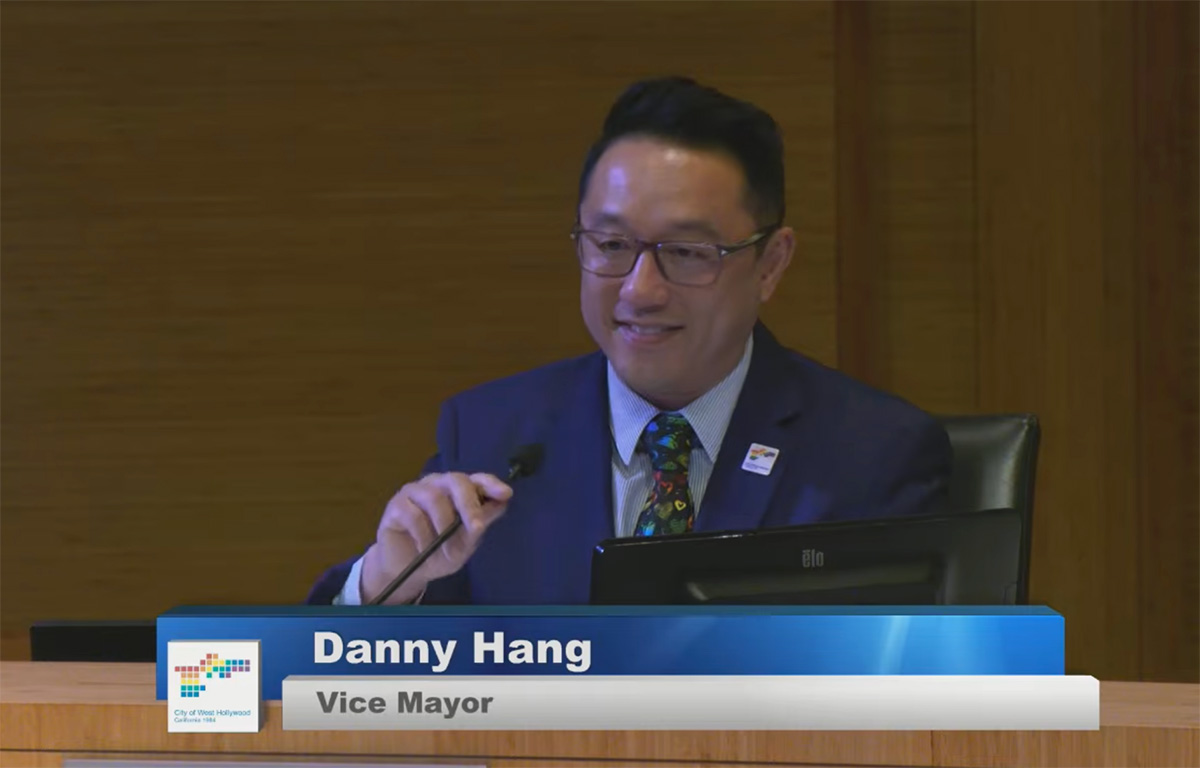
On Jan. 12, West Hollywood residents packed the City’s chambers at 6 p.m. to honor the work of outgoing mayor Chelsea Byers and witness councilmembers John Heilman and Danny Hang take their oath of office as they respectively assume their roles as Mayor and Vice Mayor for 2026.
In her last address as Mayor, Byers spoke about the optimism she holds onto in these unsteady times. To her, West Hollywood is a unique City: one that has become a model for what can be possible in an unjust society. “It’s us against the world. It’s West Hollywood on the stage,” Byers said. “It’s our story to tell, and every single person here contributes in such great ways to that.”
Byers was awarded a plaque on behalf of West Hollywood council members for her outspoken commitment to LGBTQ+ rights, economic justice, housing affordability, and policies that emphasize equity and inclusivity in West Hollywood.
Her leadership remains a bright, guiding light for Mayor Heilman, who was part of West Hollywood’s first city council after the independent city was incorporated in 1984. The spirit of that initial group remains today: queer, progressive, and led for and by the people. Yesterday’s ceremony marked the beginning of Heilman’s ninth time serving as Mayor, as well as his last year on the city council due to term limits.
Now, he leads side-by-side with a self-proclaimed “newcomer,” Danny Hang.
From the 626 to the Westside: Hang’s roots and journey
Hang was born in Monterey Park, a city in the San Gabriel Valley. The region is known for its diverse communities and AAPI-rich culture and history, and Hang recounted to the Blade the deep sense of belonging and comfort he felt growing up there. “I could go to a restaurant, speak Vietnamese or Chinese,” Hang said. “There are people who look like me out there. It is my home away from home.”
After college, he worked at the Social Security Administration, where he helped retirees, disabled people, and those impacted by loss file for Supplemental Security Income (SSI). The work was fulfilling, and he loved feeling that he had a tangible impact on others’ lives: that he could help residents grappling with difficult bureaucratic processes.
This passion grabbed the attention of L.A. County Supervisor Lindsey Horvath, who tapped Hang into serving on West Hollywood’s Disabilities Advisory Board in 2017. Hang eagerly accepted the role, having always been drawn to the vibrant, queer cultural hub. “WeHo was always the land of the unicorn: the land of magic,’ Hang told the Blade. “[This] was a town where I could be open, by myself, and find other people who were also LGBTQ+.”
After serving on the City’s Disabilities Advisory Board and, subsequently, the county’s Business License Commission, Hang noticed a lack of AAPI representation in local leadership. “There aren’t many AAPI people at all in West Hollywood. After I was on the commission, [I thought]: Hey, I think I want to run for city council,” Hang told the Blade.
Creating more inclusive leadership in WeHo
In 2024, Hang was elected to West Hollywood’s city council, becoming the first AAPI councilmember in the City’s 40 year legacy. “I want to see people who look like me in local government, because I want this community to be reflective of the modern-day people who live here. We’re a diverse community, and there’s no reason why we shouldn’t have people of color on the council, as well as more people of color appointed to our boards and commissions.”
Last night, local officials offered encouragement, support, and affirmation to Hang after he took his oath of office. “You’re already making history and certainly making waves across, not just your home region of the San Gabriel Valley, but certainly in California,” said Monterey Park councilmember Henry Lo.
Afterwards, Hang addressed the room, thanking residents, fellow council members and his family. “Standing here as the first AAPI elected to the West Hollywood City Council is deeply meaningful, and I couldn’t have done it without my parents. [They’re] right here in the front row,” Hang said. “My dad was a union worker, who showed me why standing up for workers matters. And my mom worked in a small business, owning a little nail salon in South Pasadena. She taught me what it means to care for others and to keep the community going.”
The year ahead: Heilman calls for residents to unite
Afterwards, Mayor Heilman spoke at length about the upcoming transitional year, the urgency of the current political climate, and ways that community members can step up to support each other. In his last term, he has set his eye on revitalizing the Sunset Strip, stabilizing rent and increasing housing affordability as well as examining the safety of the City’s foundational buildings, including the library and fire station.
He concluded his speech by making an unwavering stance on the “appalling” state of the federal government, stating that every West Hollywood resident must step up together in the face of ongoing federal attacks on the rights of LGBTQ+ people, specifically transgender people, as well as immigrants and other marginalized community members.
“This is a direct attack on our residents. It’s a direct attack on all of us,” Heilman said. “Now is not the time to hide. We need you…Ask what you can do to help people in the community,” he said, galvanizing residents to volunteer for the City’s various social services, nonprofits like Hollywood Food Coalition and Ascencia.
This call for unity and communal bravery echoes Byers’ belief in the courage of the people of West Hollywood. “41 years ago, a group of people defined what government could be,” Byers said. “We’re living the wildest dreams of people decades ago…and we get to be a bridge for that hope for the future. In such a critical moment, it’s truly our responsibility.”
Kristie Song is a California Local News Fellow placed with the Los Angeles Blade. The California Local News Fellowship is a state-funded initiative to support and strengthen local news reporting. Learn more about it at fellowships.journalism.berkeley.edu/cafellows.
West Hollywood
Administration refused to honor World AIDS Day; residents gathered with defiance, grief and love
Yesterday, members of the APLA Health Writers Group read moving stories to a large group of locals gathered at the AIDS monument.
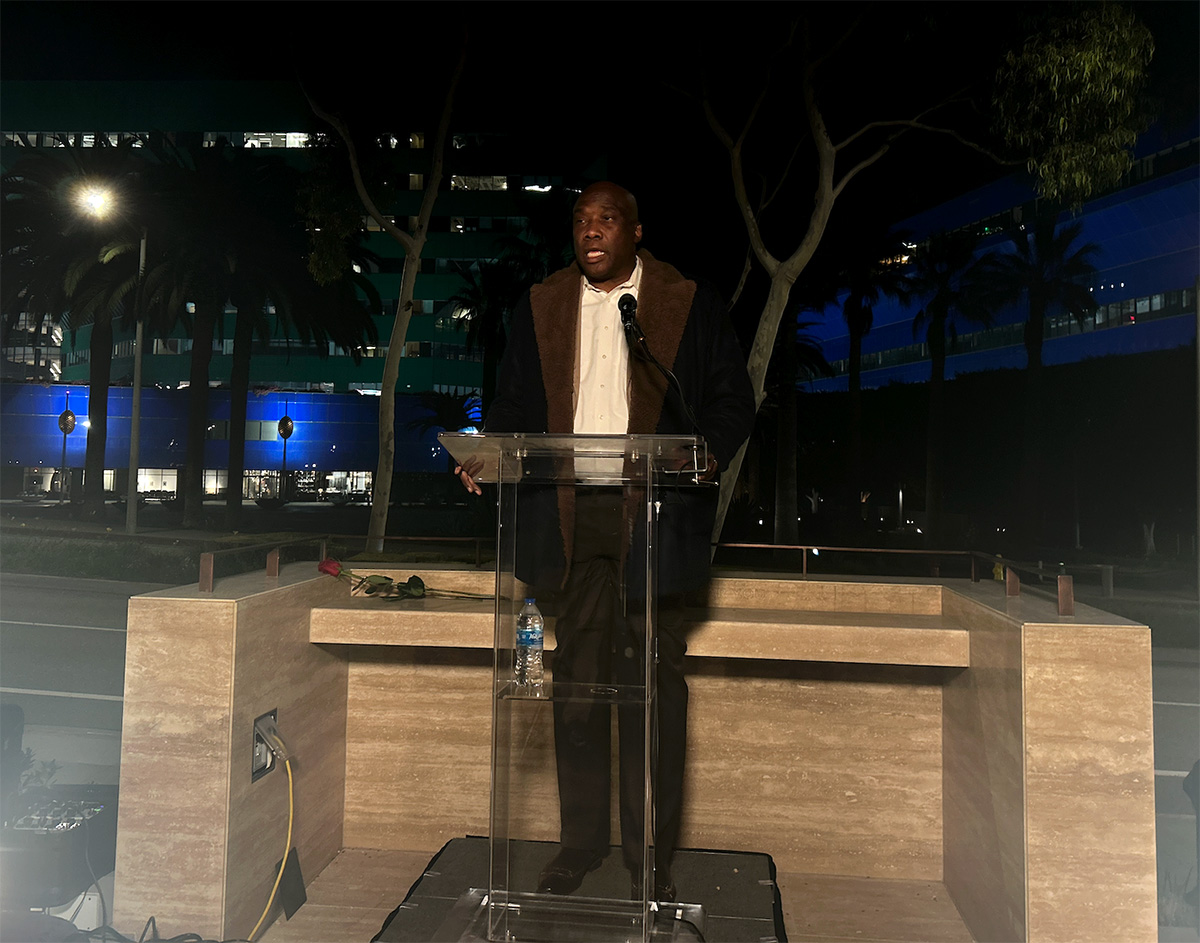
On Monday, the federal administration did not honor World AIDS Day, for the first time since the international awareness day was created in 1988. In addition to significant funding cuts to organizations focusing on HIV preventative treatment and care, the government’s halting of this commemoration perpetuates a dismissive system of inaction against LGBTQ+ people.
And yet, over 50 community members filled the empty spaces of West Hollywood’s AIDS monument yesterday evening, waiting in the night chill as city officials delivered impassioned statements and writers from APLA Health read personal pieces that centered a grief and love for those lost to the epidemic.
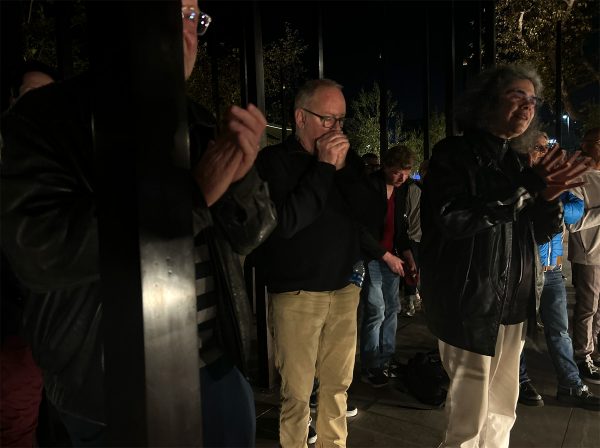
Before the readings began last night, West Hollywood vice mayor John Heilman asked for residents to join him in a righteous rage against administrative apathy. “I want to ask us all to reflect for just a moment about all of the people we lost…I want us to reflect and get angry,” said Heilman. “We have a fucking president who won’t even recognize World AIDS Day.”
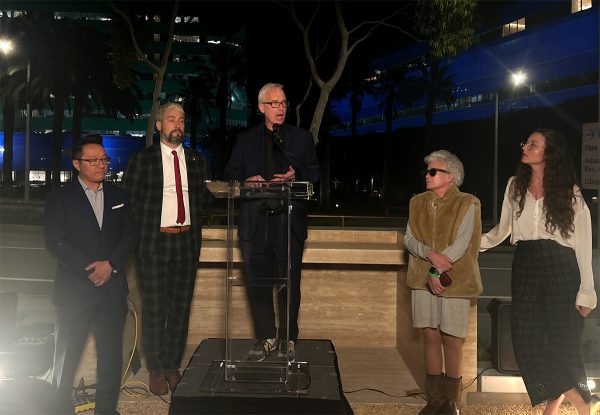
Irwin Rappaport, board chair for STORIES: the AIDS monument, echoed this immense disappointment. “Many of us here tonight lived through the 1980s, so we know what that’s like,” Rappaport said. “We also know that because of that neglect, because of that lack of caring from the federal government, we have to care for one another — and we know how to do that. When we don’t have recognition from others, we know how important it is to preserve our own history, to tell our own stories.”
Through heavy silence, five writers from APLA Health’s writers group stood tall before a podium and shared intimate writings they created about the epidemic and its personal impact on them. The collective was established in 1989 to provide an inclusive, expressive space for HIV-positive writers and allies to work on their writing and learn how to share their stories.
Writer Brian Sonia Wallace, who served as West Hollywood’s poet laureate from 2020 to 2023, has been working with the writers group for the last four years to help them hone and refine their narrative voices as they share their heaviest grief and the depths of their love for the people they lost to HIV and AIDS.
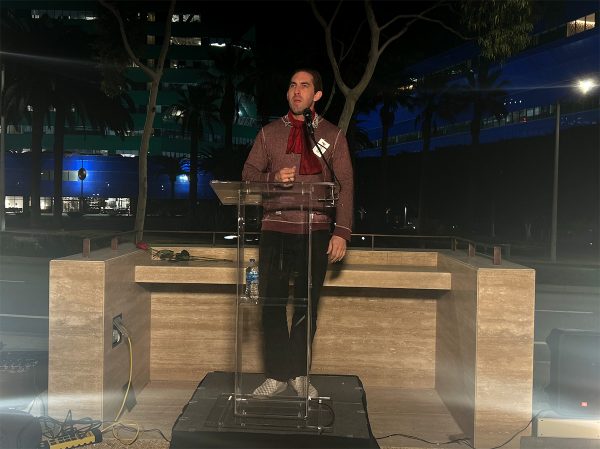
Hank Henderson, one of these writers, read from a diary entry from November 29, 1991. His voice, clear and strong, wavered as he shared about the death of his dear friend Richard. In a piece filled with lush, rich detail, painted clearly with a strong and loving voice, Henderson recounted a memory with Richard during the latter’s last years.
“The Santa Barbara sky is clear blue forever today…Yesterday came and went like a half-remembered dream between snooze alarms,” Henderson recited. “Last year, we walked to the beach. We spent hours there, played frisbee ourselves, brought the dog. Richard even yelled out 30-minute tanning turnover alarms. Yesterday, he took tiny, labored steps back to the car, used my shoulder to keep himself from falling over. Nobody said anything. We just pretend it’s normal.”
Another writer, Austin Nation, shared the story of being told he was HIV-positive at 26 years old. As a young nurse, he remembered the shock of seeing “young, beautiful men” arriving at the hospital covered in “purple, blotchy sores.” When he received his own test results, a paralyzing terror washed over his body. An incredulity followed the fear: why was this happening to him? “I got this thing for what?” Nation spoke. ”For having fun? For making love? And now it’s gonna cost me my life?”
But as he stood before the crowd, now 63 years old, he was met with applause and joy as he stated and repeated: “I’m still here. I’m still here.” The writers, in their grief and loss, have come to a place where they are able to share these stories, empowered and held. “In a world that writes off people with stories like mine,” Nation said. “It’s a hell of a good day to be alive.”
Kristie Song is a California Local News Fellow placed with the Los Angeles Blade. The California Local News Fellowship is a state-funded initiative to support and strengthen local news reporting. Learn more about it at fellowships.journalism.berkeley.edu/cafellows.
West Hollywood
West Hollywood kicks off community-focused programming for World AIDS Day
Since 1988, queer communities have come together on Dec. 1st to honor siblings and allies lost to the AIDS epidemic.
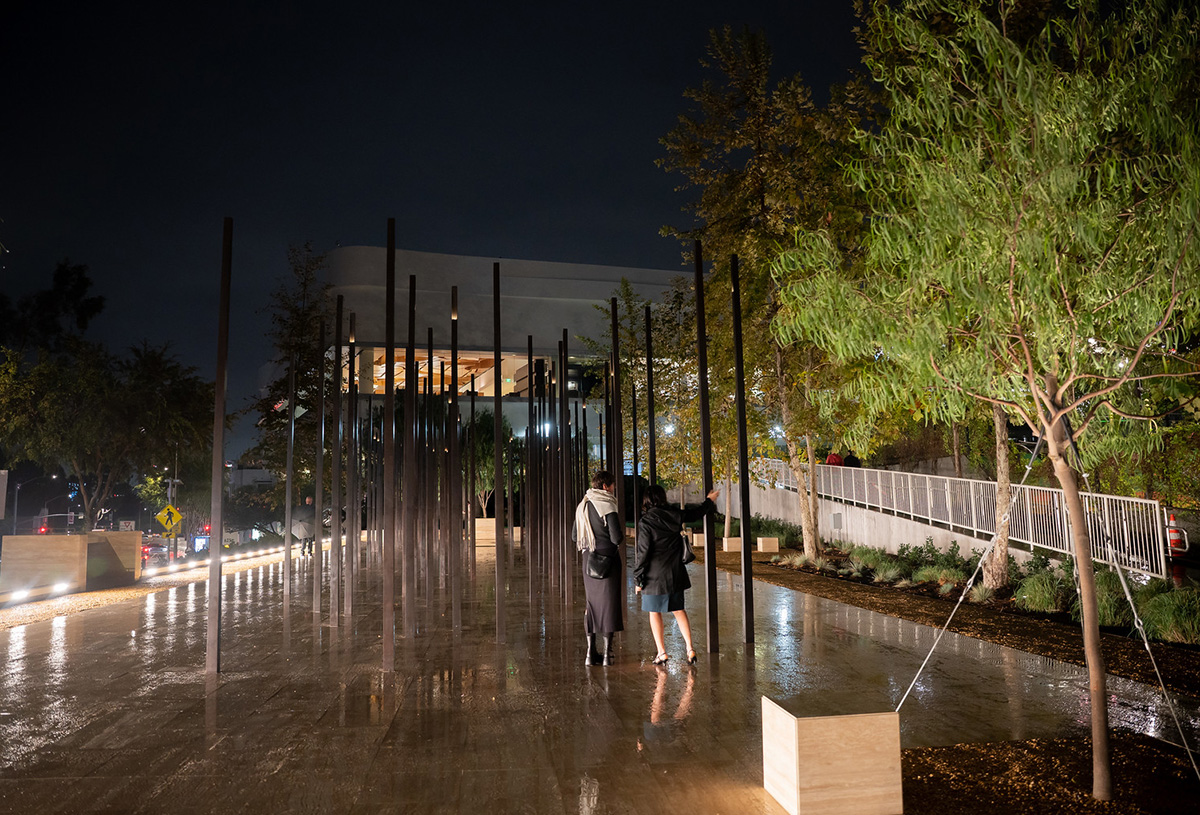
Since 1988, LGBTQ+ communities have come together on Dec. 1st to commemorate queer siblings and allies lost to the AIDS epidemic. This year’s World AIDS Day follows the theme “Overcoming disruption, transforming the AIDS response” and highlights the substantial funding cuts to research, health services, and community initiatives that have prioritized the safety of people with HIV and AIDS. The theme challenges people to think about “radical” ways to organize together and ensure that those who are impacted are able to access the care, treatment, and awareness that they need.
Beginning today, the City of West Hollywood is kicking off programming to recognize the historical transformation that local queer communities experienced during the AIDS epidemic. A panel from the AIDS Memorial Quilt will be available for viewing at the City’s Council Chambers at 625 N. San Vicente Boulevard through Monday, Dec. 15th.
Known as the largest community arts project in history, the Quilt is a powerful memorialization of loved ones who died during the epidemic. Each panel of the Quilt contains a story of remembrance, immortalizing a life cut short during the crisis. The project currently contains over 50,000 panels dedicated to over 110,000 people, all woven together in a 54-ton tapestry piece.
If you’re visiting the panel today, there will be an additional gathering opportunity tonight at the West Hollywood Park for STORIES: the AIDS Monument. From 5:30 to 8:30 p.m., members from the HIV-positive writers collective APLA Health Writers Group will present intimate readings that reflect on their experiences. Community members will be allowed time to wander through the monument and also preview the new Herb Ritts: Allies & Icons exhibition at ONE Gallery after the program. The art show includes striking black and white portraits of activists who stood in alliance with those most impacted during the AIDS epidemic.
Additionally, fresh flowers will be placed on the bronze plaques that line the City’s AIDS Memorial Walk. During the AIDS epidemic, West Hollywood was at the center of a rampant grief and loss that juxtaposed vibrant programming and efforts that boosted healing and fought against stigma and violence. It continues to be a vibrant space that houses various organizations and memorial spots that continue to uphold the revolutionary history and advocacy work that has continued since the epidemic’s beginnings.
Today, West Hollywood is in the process of executing its HIV Zero Strategic Plan, an initiative that began in 2015. Its goals include: expanding healthcare access for people living with HIV and AIDS, reducing the rate of infections, lessening health disparities and inequities for those impacted, and slowing the disease’s progress from advancing to AIDS.
According to West Hollywood mayor Chelsea Byers at a recent Cityhood event, the initiative carries forth the City’s “bold vision” and commitment to ensuring marginalized community members living with HIV do not face the life-threatening discrimination and health barriers that their elders experienced.
To learn more about the City’s programming, read here.
Kristie Song is a California Local News Fellow placed with the Los Angeles Blade. The California Local News Fellowship is a state-funded initiative to support and strengthen local news reporting. Learn more about it at fellowships.journalism.berkeley.edu/cafellows.
West Hollywood
Today, West Hollywood celebrates 41 years of queer cityhood
WeHo’s city officials are trying to preserve the fight for queer safety and rights that began decades before.
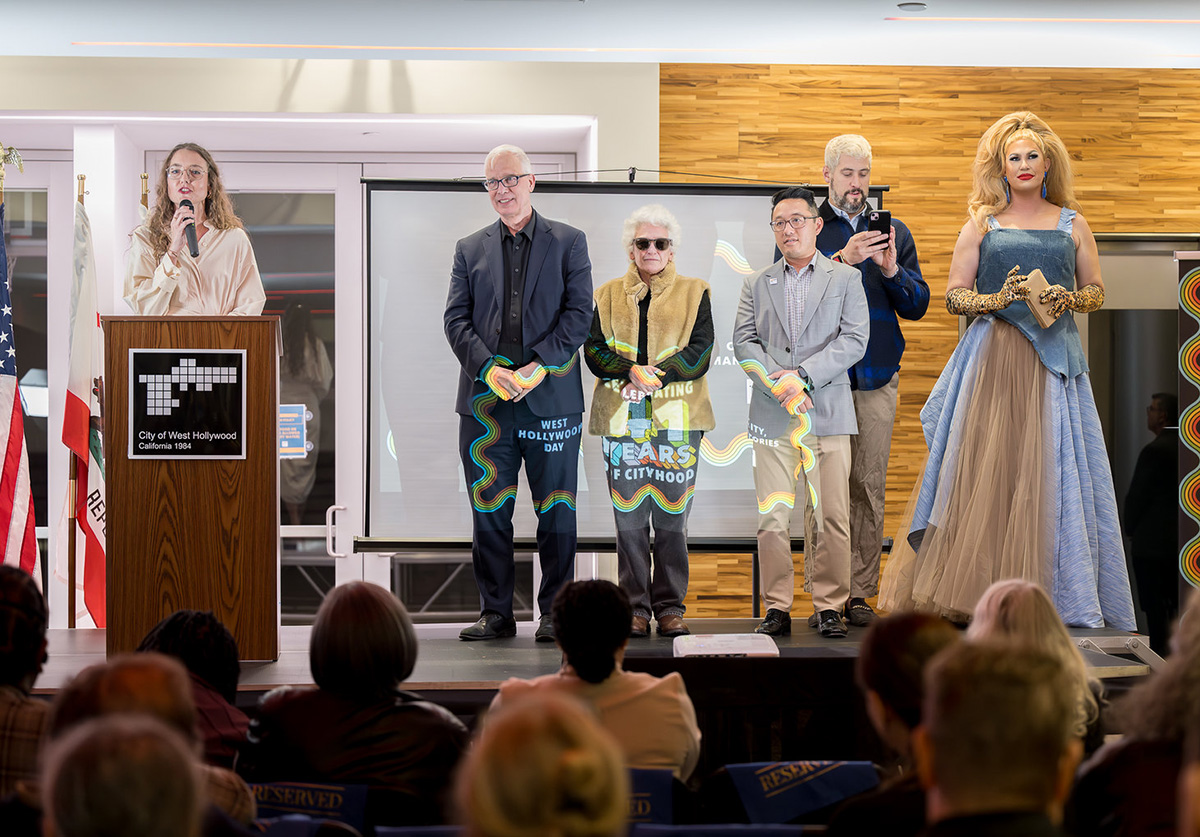
On Nov. 29th, 1984, West Hollywood was incorporated as an independent City, making its sovereignty official and solidifying it further as a sanctuary for LGBTQ+ community members, their stories, and their freedoms. Inspired by other prominent gay neighborhoods like New York’s West Village and San Francisco’s Castro District, West Hollywood was established by local queer advocates and residents. Their first city council was made up of a majority gay governing body — the first in the world, according to the West Hollywood History Center.
This political legacy, and the city’s vibrant and proudly queer history, continues to be preserved. On Monday’s celebratory event, West Hollywood mayor Chelsea Byers announced that the City’s current council “continues to be a majority-LGBTQ+ body,” holding tightly onto a “spirit” that reflects, prioritizes, and fights for Los Angeles’ queer community.
West Hollywood has been through various transformations, cocooning and revitalizing itself through the country’s evolving political and cultural upheavals. It has long been home to a ravishing nightlife that celebrates LGBTQ+ expression, and was a focal point for queer-led liberation and activism in the late 1960s and early 1970s. Trailblazers like Morris Kight led the first gay pride march through West Hollywood’s streets in 1970 and opened the Los Angeles LGBT Center to nourish the City’s robust and blossoming queer communities.
Today, West Hollywood continues to be the place where queer organizers and residents plant roots. Earlier this month, STORIES: the AIDS monument opened up in the City’s park after over a decade of work, shining a light on the legacies of gay activists, artists, historians, and community members who fought to survive as anti-gay stigma led to the erasure of their rights and lives.
As waves of anti-LGBTQ+ hate and violence continue to surge through the country, West Hollywood elected officials aim to continue doing the critical work that began decades before them: the work that protects the ability of queer residents to advocate for themselves, to live with protections and dignity, and to relish in joy. Mayor Byers is inspired by the resilience of the community members who stood together to establish this independent City in 1984. “The people who lived here…wanted a city with strong protections for renters, with progressive policies, and with a local government that would actually reflect and protect the people who call this place home,” said Byers, at the Nov. 24th celebration.
Over 40 years later, these needs have not changed. The way forward? Remembering and fighting for that initial promise and hope. “We are a chorus. We are a tapestry,” said Byers. “We are the product of thousands of people who, for more than four decades, have dared to say: We can build something better here.”
Kristie Song is a California Local News Fellow placed with the Los Angeles Blade. The California Local News Fellowship is a state-funded initiative to support and strengthen local news reporting. Learn more about it at fellowships.journalism.berkeley.edu/cafellows.
West Hollywood
From nickname to reality, the Rainbow District is made official by the City of West Hollywood
The mile along Santa Monica Boulevard from N. Doheny Drive to N. La Cienega Boulevard welcomes residents and visitors to come as they are
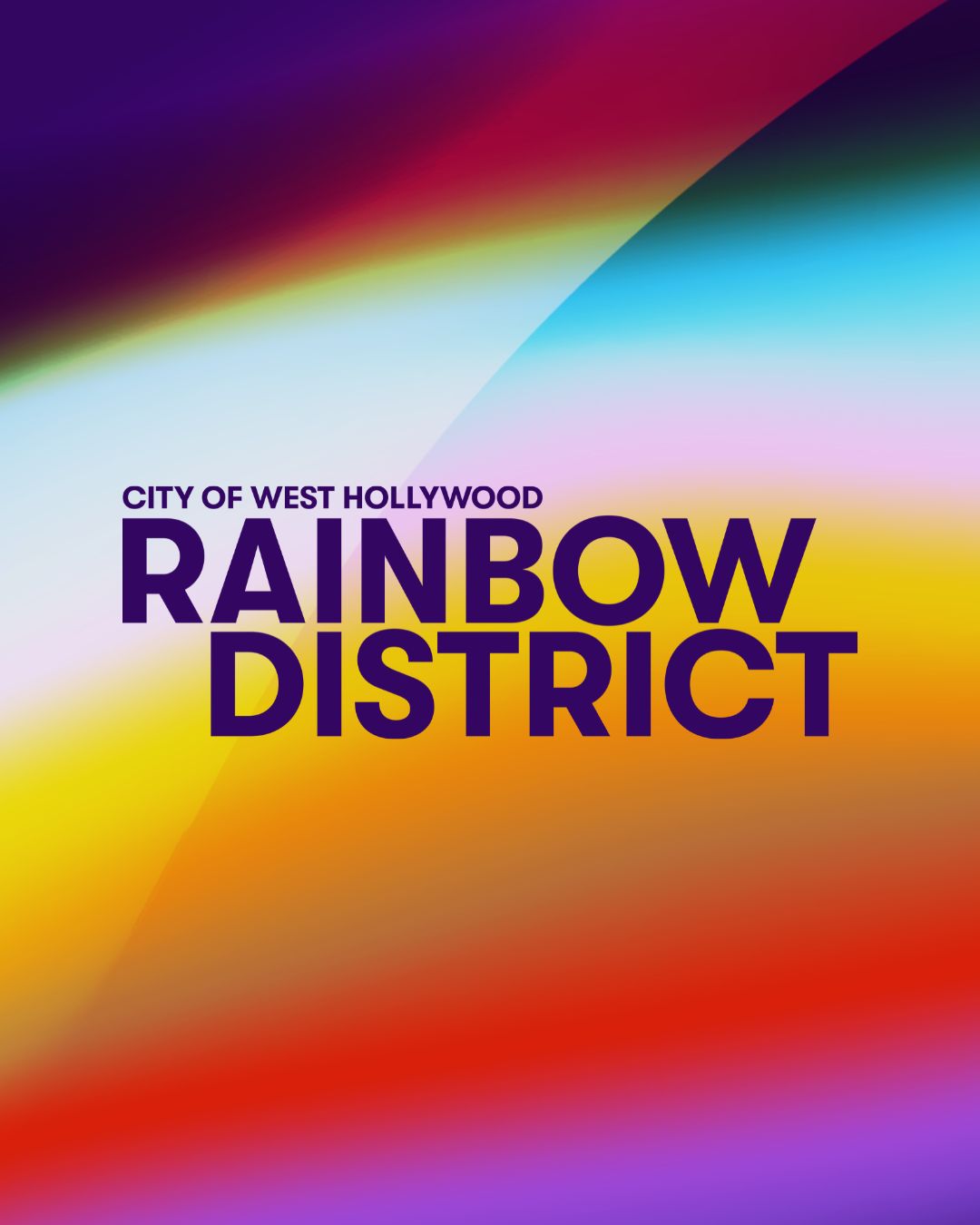
Even in today’s political climate, we will not be hidden.
The vibrant stretch on Santa Monica Blvd of over 50 local businesses, representing the full spectrum of LGBTQ+ expression, from N Doheny Dr to N La Cienega, has had the loving nickname of the Rainbow District for decades. Well, now it’s official. From nightlife to restaurants to community organizations, the City of West Hollywood has formally designated the space as such, honoring the neighborhood’s legacy as a safe haven for the queer community and beyond.
In addition to making the name official, the Rainbow District is being launched with a full range of social media, including Instagram, TikTok, and Facebook, keeping the residents and visitors updated on all upcoming events and happenings in the neighborhood.
Long known as a beacon of acceptance, inclusion, and visibility, where everyone is welcome, this iconic mile-long corridor is now formally recognized for what it has always been: a place where people from every walk of life can come together, be themselves, and celebrate the beauty of diversity.
City of West Hollywood Mayor Chelsea Lee Byers states, “For generations, the City of West Hollywood’s Rainbow District has been a place where LGBTQ+ people take their first steps into living openly, where the warm embrace of community is found at every turn, and where the joy of living out, loud, and proud fills the streets. The City’s official designation of the Rainbow District honors both the legacy and the future of this vibrant neighborhood, home to beloved entertainment venues, bars, and restaurants that have long served as cornerstones of LGBTQ+ life. Today, the Rainbow District is more alive than ever, and it will always stand as a beacon of hope, pride, and belonging and as a reminder that everyone deserves a place to celebrate joy, to be seen, and to be supported.”
The Rainbow District officially joins a nationwide list of iconic LGBTQ+ landmarks. West Hollywood will not be hidden amid political backlash and will continue to protect queer spaces, uplift queer voices, and foster a safe and joyful environment for all.
“This designation is not only a celebration, but it also serves as a promise,” said Visit West Hollywood President & CEO Tom Kiely. “A promise to keep LGBTQ+ spaces visible, valued, and vibrant for generations to come. As the Rainbow District continues to evolve, it will remain a place where locals and visitors alike can connect through culture, creativity, and community. The City’s formal designation affirms its significance and highlights The Rainbow District as the ultimate playground for travelers seeking a unique, inclusive, and authentic experience.”
The Rainbow District will be home to upcoming community events that include:
- Winter Market & Ice Skating Rink — December 2025
- Go-Go Dancer Appreciation Day — March 2026
- Harvey Milk Day — May 22, 2026
- WeHo Pride Weekend & the OUTLOUD Music Festival at WeHo Pride — June 5–7, 2026
Follow the Rainbow District on socials to discover local happenings, support small businesses, and be part of a neighborhood that celebrates every person for exactly who they are.
Instagram: @RainbowDistrictWeHo TikTok: @RainbowDistrictWeHo
Facebook: facebook.com/rainbowdistrictweho More Info: visitwesthollywood.com/rainbowdistrict
West Hollywood
West Hollywood’s AIDS Monument preserves the pain and power of people lost to the crisis
STORIES: The AIDS Monument is now available to view at West Hollywood Park, 15 years after its conception.
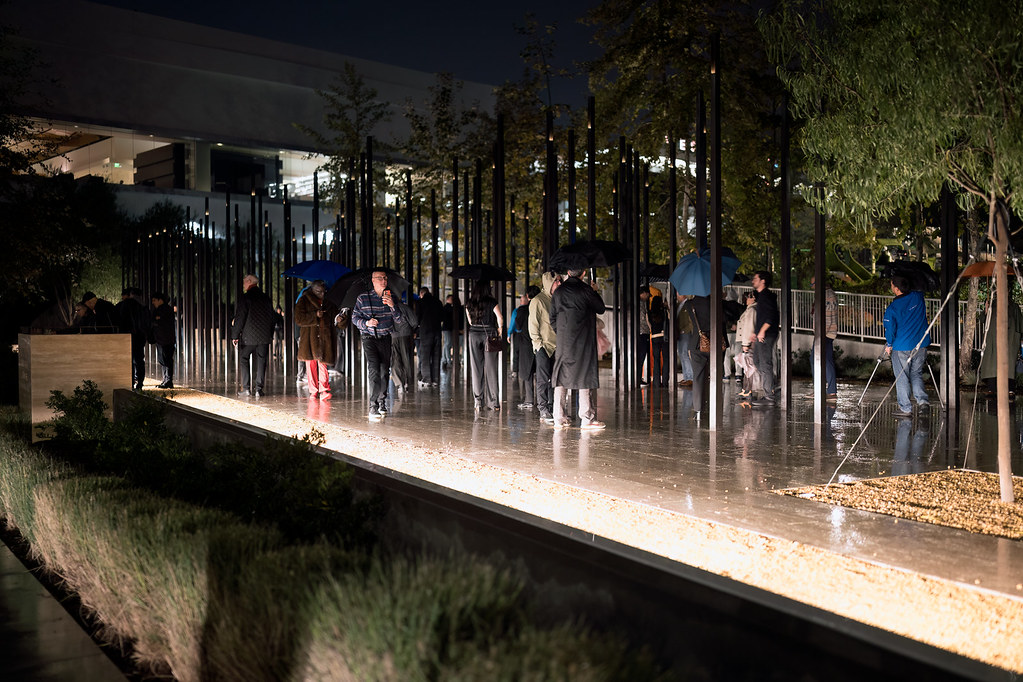
It was 1985, at the height of the AIDS crisis, when Irwin Rappaport came out as gay. As he came to terms with his identity, he witnessed people around him grow weaker: their faces becoming gaunt, painful lesions developing on their bodies. Five years later, he began volunteering as a young lawyer at the Whitman-Walker Clinic, a community health hotspot in Washington, D.C. that created the first AIDS hotline in the city, opened homes for patients with AIDS, and distributed materials that promoted safe sex.
The work being done at the clinic was instrumental, essential, and deeply painful. “When you see that sickness and experience that death among your friends and people you know, and when you’re writing wills for people who are much too young in ordinary times — it has an impact,” Rappaport told the Blade. “And even though in 1996 we saw life-saving medications come around, you never forget the sense of fear that permeates your life. The sense of loss.”
Determined to honor and share the legacies of people who died from AIDS, Rappaport joined the Foundation for the AIDS Monument (FAM) board to work towards the organization’s goal of creating a physical monument dedicated to memorializing these histories. FAM treasurer Craig Dougherty first conceived of this project in 2010 and, after 15 years, STORIES: The AIDS Monument is now available to the public for viewing.
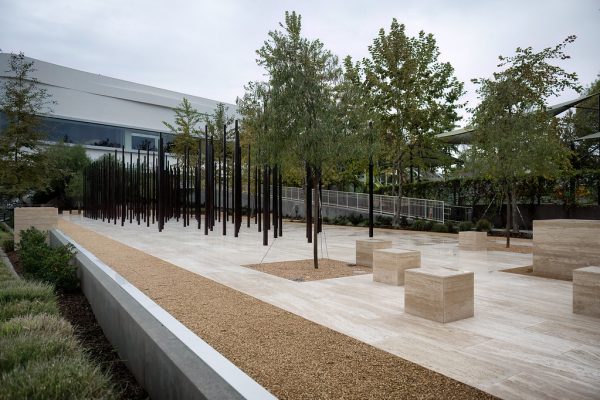
Created in collaboration with the City of West Hollywood, STORIES: The AIDS Monument is composed of 147 vertical bronze pillars known as “traces.” Designed by artist Daniel Tobin, 30 of these traces are engraved with words like: activism, isolation, compassion, and loss, which correlate to the over 125 audio stories collected and archived on the foundation’s website. This multimodal storytelling allows people who come across the monument to engage more intimately with the people represented by these physical pillars.
At nighttime, lights transform the monument into a candlelight vigil, providing a warm glow to a wanderer’s journey through the structure.
When people were able to walk around the traces at Sunday’s grand opening ceremony at the Pacific Design Center, the last remnants of the weekend’s rainstorm created a kind of “spiritual” and reverent atmosphere for those gathering, according to Rappaport. “I think there’s a certain peacefulness and serenity about the design, an opportunity for reflection,” he continued. “For some, it may bring back incredibly painful memories. It might bring back wonderful times with friends who are no longer here. It might remind them of their own caregiving or activism, or the sense of community that they felt in striving with others to get more attention to the disease.”
Now that the monument has been built, FAM has passed the mantle of management and programming to One Institute, a nonprofit that engages community members with queer history through panels, screenings, and other educational initiatives. One Institute plans to host monthly docent tours, art installations, and other special events during various LGBTQ+ national awareness days, including the upcoming World AIDS Day in December.
Rappaport also hopes to do outreach with local schools, so that young students are able to engage with the monument, learn about the people who were affected by the AIDS crisis, and interact with the ripples of transformation that this time period sparked in politics, research, the arts, and within society. “For younger people, I think [this is] an invitation for them to understand how they can organize about issues that they care about,” Rappaport said. “[So] they can see what the HIV and AIDS community did as a model for what they can do to organize and change the world, change culture, change law, change politics, change whatever they think needs to be changed. Because we had no other choice, right?”
West Hollywood
West Hollywood invests $1 million to build LGBTQ+ Olympic hospitality house
Pride House LA/WeHo will be an interactive space for queer athletes and allies to celebrate the 2028 Summer Games together.
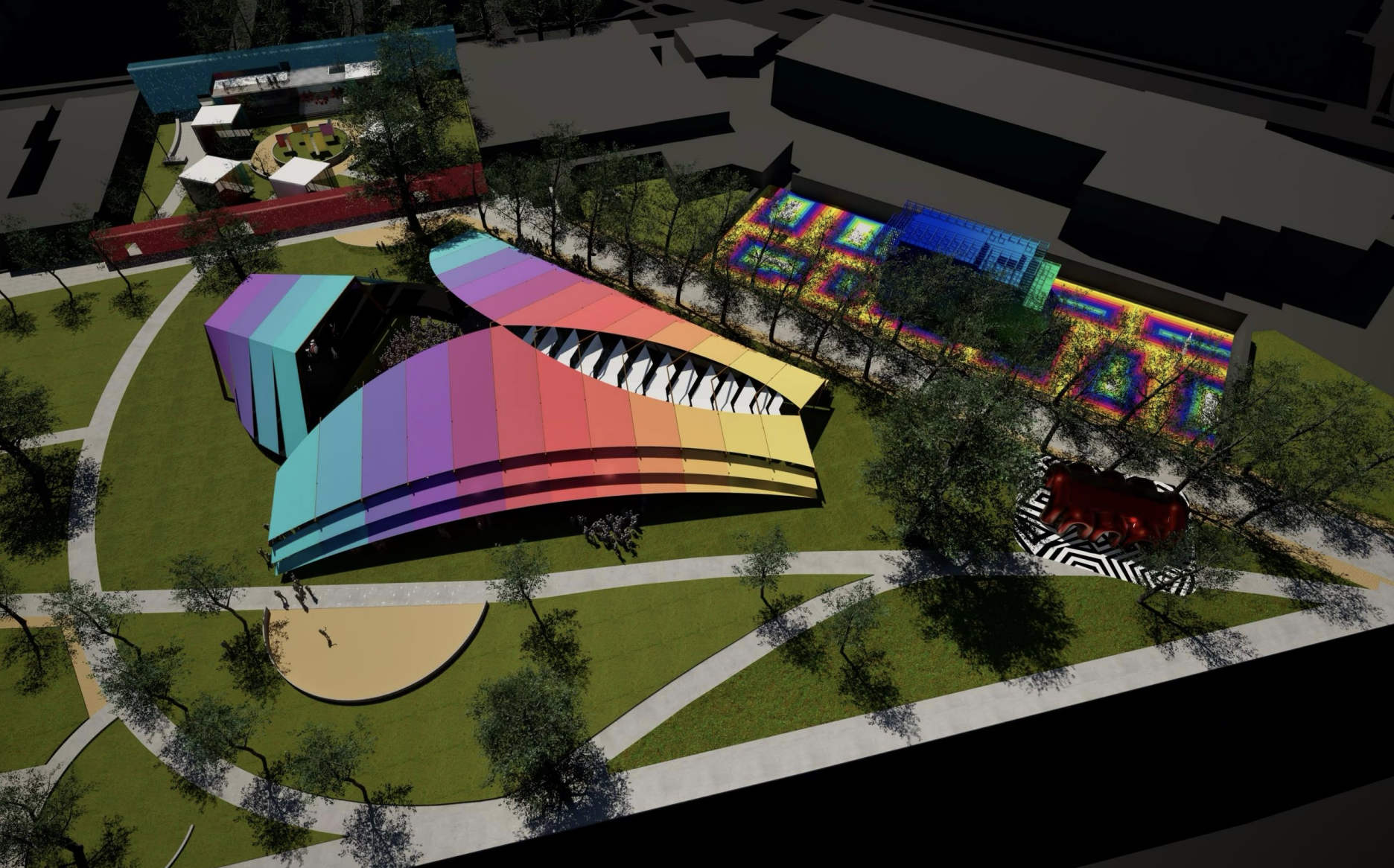
The first-ever Olympic hospitality house began with humble roots in 1992: a tent pitched on the Port of Barcelona for athletes to gather with their families. Since then, they transformed into fixtures of several major sporting events, with hopes of fostering belonging and safety for athletes of various cultural backgrounds.
It wasn’t until 2010 that the first LGBTQ+ hospitality house, the Pride House, appeared during the Winter Olympics in Vancouver. Over the years, its existence and visibility have faced barriers. During the 2014 Sochi Winter Olympic Games in Russia, Pride House International was denied from organizing its safe hub. The rejection was a blow to the visibility and safety that the organization was trying to promote and create for queer athletes. But this didn’t go unnoticed. International fans demonstrated quiet resistance, hosting remote Pride Houses in support of the Olympians who were barred from openly communing and celebrating together.
As Los Angeles prepares to host the Summer Olympics in July 2028, Pride House is coming back stronger than ever. In early October, the West Hollywood city council approved an agreement that would allocate $1 million to sponsor Pride House LA/WeHo as they prepare to build a temporary structure at West Hollywood Park for the 2028 Games. For 17 days, vibrant LGBTQ+ sports programming will fill the park’s grassy knolls.
Pride House LA/WeHo CEO Michael Ferrera detailed at a Nov. 1st Out Athlete Fund fundraising event that the team plans to build a concert stage to seat over 6,000 people. There will also be a museum that will take viewers through 100 years of queer Olympics history, viewing areas for people to watch the games, and a private athlete village for queer Olympians. “The dream of that is — imagine you’re an athlete from a country where you can’t be out,” said Ferrera. “You come here, and you can be safe and sound.”
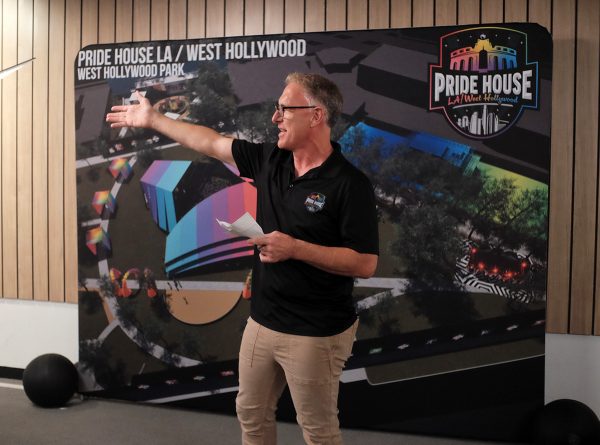
As outlined in the city council agreement and stated by Ferrera, most of the programming will be free and open to the public, and in the heart of a neighborhood that many of the county’s queer residents recognize as their safe haven. “We’re centering this important event in West Hollywood Park where our community has come together for decades in celebration, in protest, to support each other and to live our lives,” Pride House LA/WeHo CEO Michael Ferrera wrote to the Blade. “There is no place that is more representative of inclusion and safe spaces.”
The City of West Hollywood is promoting this inclusion further by asking for local community members to voice their perspectives on the formation of Pride House LA/WeHo at West Hollywood Park. On Monday, a community conversation will take place at Plummer Park to encourage residents to help shape the cultural programming that will take place in the summer of 2028. Another conversation will take place on Nov. 21st at the City’s 40th anniversary of Cityhood event.
“We couldn’t do this without the generosity and partnership of the city of West Hollywood,” Pride House LA/WeHo marketing co-lead Haley Caruso wrote to the Blade. “We are so happy to help bring the Olympic spirit to West Hollywood while also providing the community a safe and entertaining venue to enjoy the Games.”
Head to PrideHouseLAWeho.org for more information
West Hollywood
Drag performers delight Carnaval crowds with demure and daring dances
The Halloween party is one of the most anticipated events for queer Angelenos.
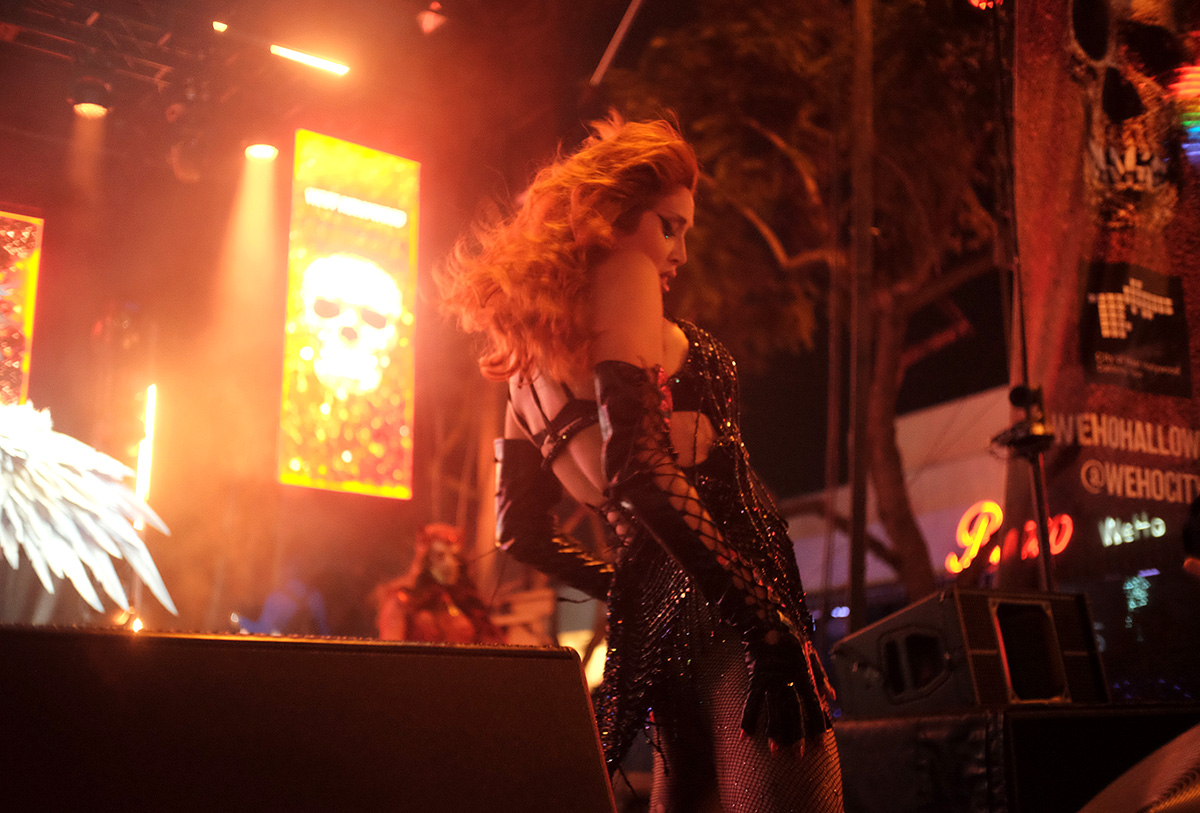
On Friday night, techno pop remixes surged through a tight block on Santa Monica Boulevard, where hundreds of eager partygoers danced near a pop-up stage. Bass-heavy grooves echoed across neighboring streets as Beetlejuices, angels, and vampires swayed and thumped to the beat.
Oct. 31 marked the arrival of West Hollywood’s annual Halloween Carnaval, one of the county’s citywide celebrations — and one of the most anticipated for queer Angelenos.
The first Halloween Carnaval was celebrated in 1987, and has since become one of the most awaited nights for local queer celebration. Drag performers donning elaborate costumes and glamorous makeup set the stage ablaze as they strutted, flipped their hair and danced to the cheers of a crowd that grew enormously as the night went on. The energy was infectious, and the Los Angeles Blade was on the scene to photograph some of these moments.
Image captures by Blade reporter Kristie Song.
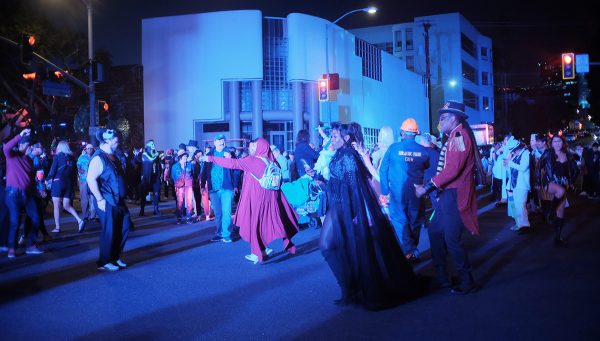
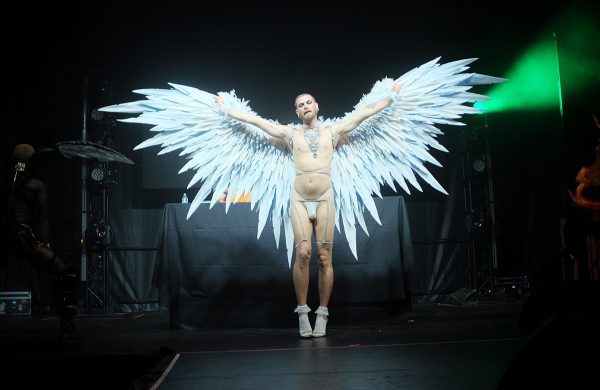
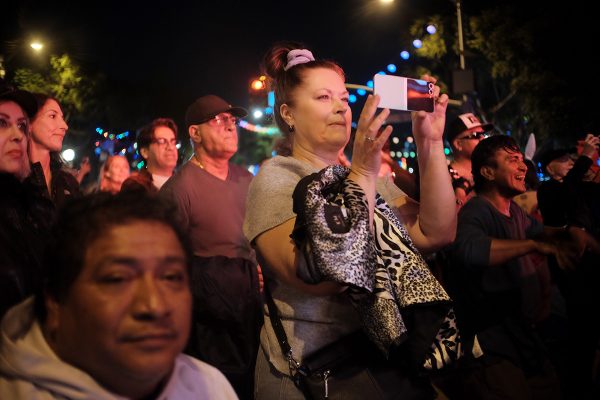
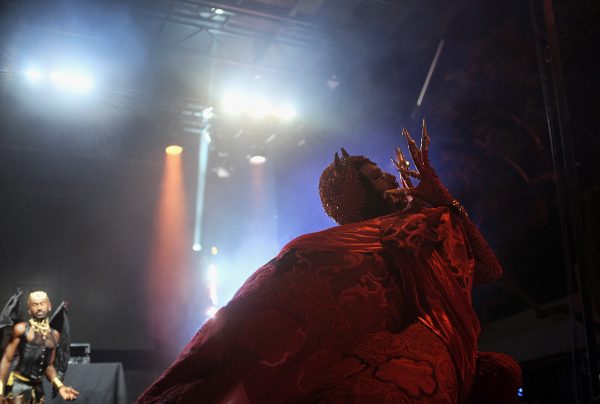
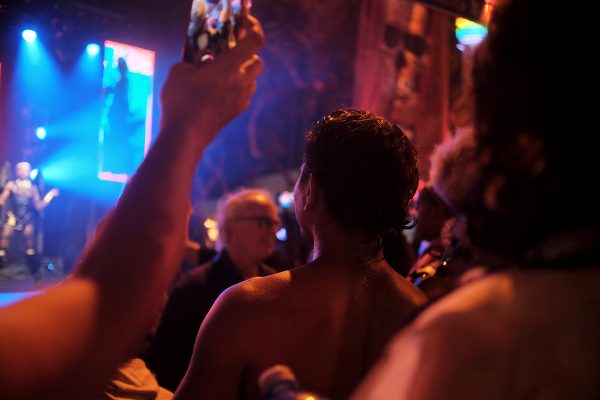
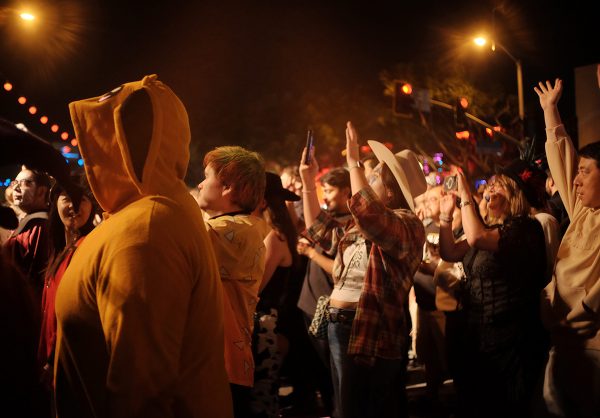
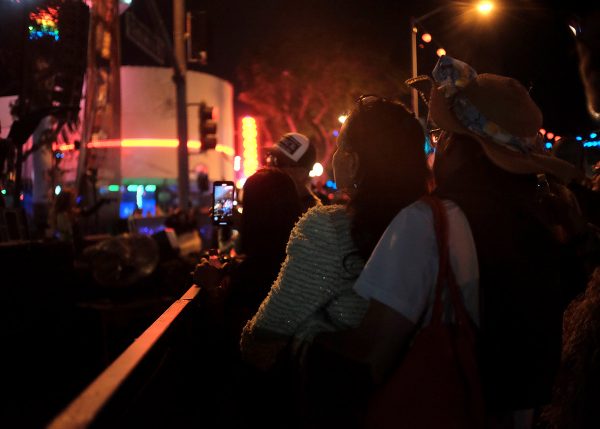
West Hollywood
West Hollywood installs new intersex pride flags on Intersex Awareness Day
On Sunday, city councilmembers gathered to raise two new pride flags to honor intersex community members
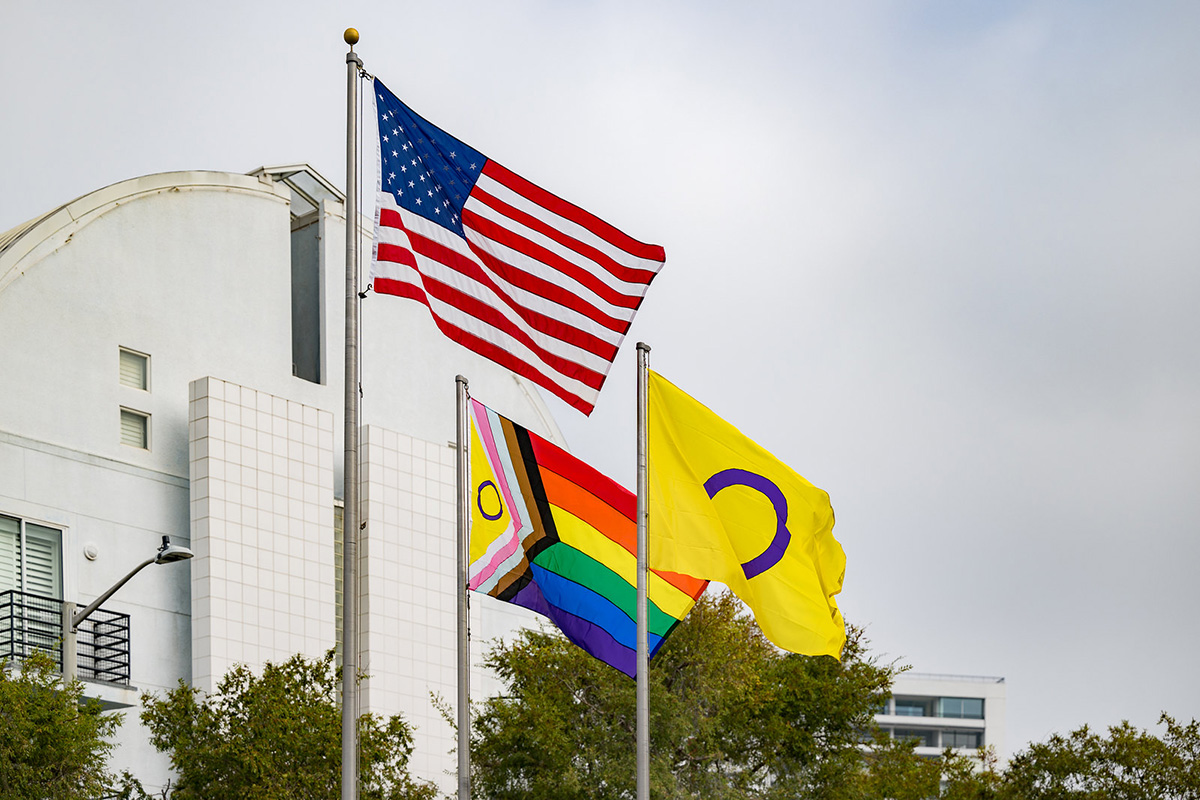
Early yesterday morning, on National Intersex Awareness Day, West Hollywood mayor Chelsea Byers, Vice Mayor John Heilman, as well as councilmembers Danny Hang and John M. Erickson gathered to install and raise two new intersex pride flags. They fly side by side with the American flag, upholding the City of West Hollywood’s vision of solidarity between national pride and LGBTQ+ visibility.
“We are facing unprecedented attacks on our community. It is important that we recognize the entirety of the LGBTQI+ community,” Vice Mayor John Heilman wrote to the Blade. “Intersex people have long been ignored and their issues disregarded. Raising the intersex flag also raises awareness about the challenges many intersex people face.”
Intersex people are born with naturally occurring variations in reproductive and sexual anatomy that don’t fit into binary “male” or “female” categorizations. As Planned Parenthood details, this can look like having both ovarian and testicular tissues or having combinations of chromosomes that aren’t “male” or “female,” just to name a few. According to the Human Rights Campaign Foundation, one of the biggest issues intersex people face is non-consensual surgeries performed when they are children. These operations are considered medically unnecessary and can leave lasting physical and psychological damage on intersex youth.
The fight for bodily autonomy and intersex visibility was the main reason behind the first action organized by intersex advocates and trans allies on Oct. 26th, 1996. Protestors stood outside the Boston Convention Centre, passed out leaflets, and spoke with clinicians, nurses, and other medical professionals attending the annual American Academy of Pediatrics conference.
One of the main leaders behind this movement was Morgan Holmes, an intersex woman who had experienced a violating medical procedure meant to “correct” her anatomy. In May of 1996, she presented testimony in a room adjacent to a symposium on genital surgery for intersex infants, a conference she and other members of her advocacy group had been rejected from.
“What I am saying is that my medical ‘care-givers’ failed to respect my autonomy or my intelligence when they assumed that because I was a child, they could do whatever they wanted as long as my father provided his consent,” Holmes said. “And when I began to balk, instead of questioning their own treatment of me, they blamed my body, and they cut it up.”
Today, intersex people and their stories are more broadly recognized, but still struggle to reach mainstream audiences when it comes to discussions around LGBTQ+ identity. West Hollywood city officials see this addition of intersex pride flags as a step forward. “Updating our city’s flags was my item because visibility matters,” councilmember John M. Erickson wrote to the Blade. “Intersex people have always been part of our story, and it’s time that their history, identity, and pride are recognized in the public spaces that belong to all of us.”
West Hollywood
Residents remain dubious as officials claim “no ICE involvement” at The Abbey
The Oct. 17th “undercover operation” was addressed at the latest city council meeting
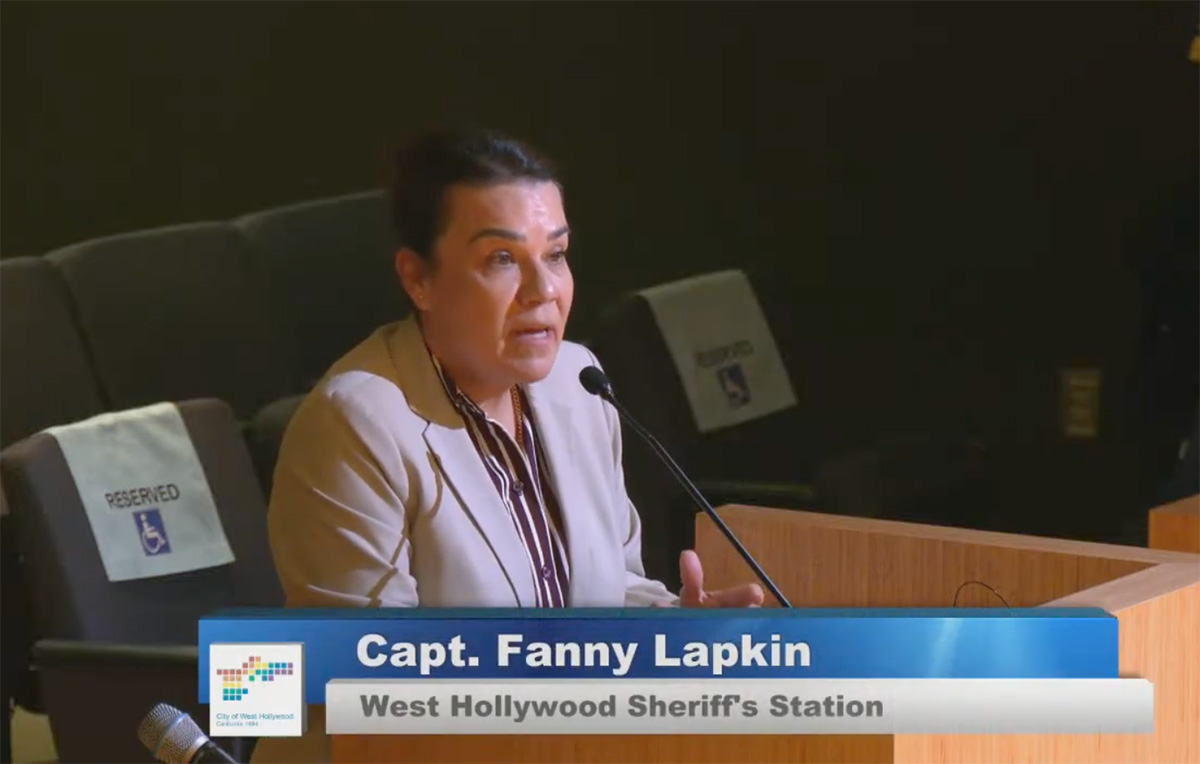
On Friday, Oct. 17th, West Hollywood gay bar The Abbey found itself in the center of a social media storm as clips were shared depicting the presumed presence of federal Immigration and Customs Enforcement (ICE) officers. In a video posted on Oct. 18th by Charles Hernandez, who often creates content around gay nightlife in Los Angeles, several people are seen standing in a line as they are apprehended and handcuffed by officers wearing sheriff’s vests and tees. Hernandez noted that, while dressed in varying attire with the word “sheriff” on it, none of the officers were willing to identify themselves or present their badges upon request.
Hernandez can be heard asking the officers about the cause for arrest, to which one responded: “I don’t have to tell you our cause.” The video creator also questioned another officer, who can be seen wearing a gaiter to cover his face. “Isn’t it illegal to wear a mask in California?” Hernandez asked. “He has COVID,” an officer replied. In September, Governor Newsom signed five bills that weakened federal agents’ abilities to access school sites and health facilities, and prohibited them from hiding their identities. More specifically, SB 627 requires all California law enforcement agencies to create written policies limiting their officers’ use of facial coverings by July 1, 2026.
As this video circulated around the web, the West Hollywood Sheriff’s Station released an online statement of their own, denying allegations that the officers present were federal immigration officers. The station also claimed that the night’s events were a result of an “undercover operation” that was conducted in response to reports made about pickpocketing and the transportation, use, and sale of illegal substances. “Several arrests were made,” the statement read. “ICE was not involved.”
Still, residents remained unconvinced, criticizing the station’s lack of transparency, careful conduct, and accountability. Over 50 people took to the comments of this statement to voice their discontent. “[It] was not that long ago when officers would raid LGBTQ spaces and arrest people simply for being there,” one comment read. “A raid such as this does not inspire feelings of safety for our community. Especially in times when people are being kidnapped off the street by masked federal agents. There simply must be a better response to pickpockets and “other criminal activity” than undercover raids by masked officers and transporting detainees in unmarked vehicles. DO BETTER.”
Two days later, at the West Hollywood city council meeting, West Hollywood Sheriff’s Station Captain Fanny Lapkin took to the podium to address some of these concerns. Echoing the station’s Instagram statement, Lapkin confirmed that the “pre-planned operation” was created in response to “concerns from our businesses and our community in regards to the pickpocketing, to the narcotics, and also to the illegal vending and some of the criminal activity during illegal vending.” Lapkin also confirmed that no federal agents were present, stating that everyone who took part in the operation was “sheriff’s department personnel.” And because the arrests were made as part of a planned operation, Lapkin further stated that warrants were not “necessary.”
The events were discussed with brevity at the meeting, but community ire has not been dispelled. Several people continue to question the ethics of this undercover operation: Why were the individuals being arrested not clearly told the reason for their detainment? Why were unmarked vehicles present? Why conduct the operation in this way, as Los Angeles neighborhoods continue to stay on high alert over immigration raids? These questions remain unanswered as more specifics about the operation have yet to be released.
-
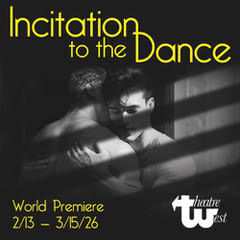
 Theater4 days ago
Theater4 days ago‘Incitation to the Dance’ asks what happens to love when a younger man cuts in
-

 New York4 days ago
New York4 days agoPride flag removed from Stonewall Monument as Trump targets LGBTQ landmarks
-

 Philippines4 days ago
Philippines4 days agoPhilippines Supreme Court rules same-sex couples can co-own property
-
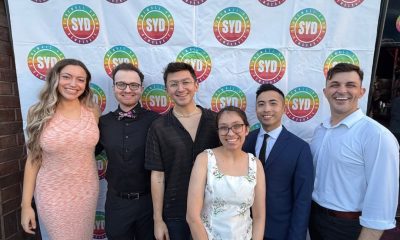
 Los Angeles3 days ago
Los Angeles3 days agoStonewall Young Democrats bounces back from “quiet year” with Hero Awards
-

 Florida4 days ago
Florida4 days agoDisney’s Gay Days ‘has not been canceled’ despite political challenges
-

 Italy5 days ago
Italy5 days agoOlympics Pride House ‘really important for the community’
-
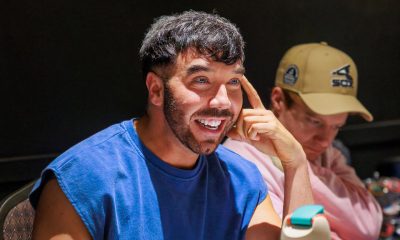
 a&e features1 day ago
a&e features1 day agoFrom ‘So Random’ to sexy theater: LA’s very own Mathew Scott Montgomery
-
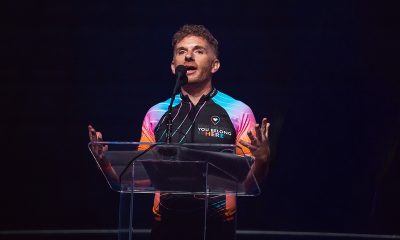
 Los Angeles1 day ago
Los Angeles1 day agoA new “queer summer camp” cycling event rises from the legacy of AIDS/LifeCycle
-
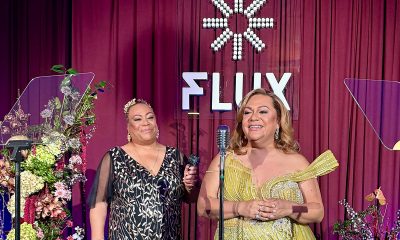
 Transgender2 days ago
Transgender2 days agoTrans-led organization FLUX celebrates a decade of “transformative” service to TGI communities
-

 Commentary2 days ago
Commentary2 days agoWhat Grindr’s pricey new subscription says about the gays, intimacy, and capitalism in the age of AI

